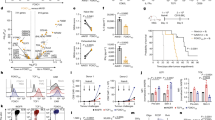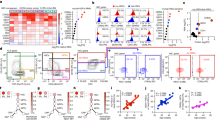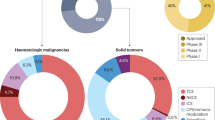Abstract
Primary T cell activation requires B7-CD28 and CD40-CD154 costimulation, but effector T cell functions are considered to be largely independent of these costimulatory pathways. Although blockade of costimulation with cytolytic T lymphocyte–associated antigen 4–immunoglobulin (CTLA-4–Ig) or monoclonal antibody (mAb) to CD154 prolongs allograft survival, chronic rejection follows, which suggests that additional key costimulatory pathways are active in vivo. We found that both antibody to inducible costimulator (anti-ICOS) and an ICOS-Ig fusion protein suppressed intragraft T cell activation and cytokine expression and prolonged allograft survival in a manner similar to that in ICOS−/− allograft recipients. The combination of anti-ICOS therapy and cyclosporin A led to permanent engraftment. In addition, ICOS–B7RP-1 costimulation was required for the development of chronic rejection after CD40-CD154 blockade. These data demonstrate a key role for the ICOS–B7RP-1 pathway in acute and chronic rejection and highlight the benefits of targeting this pathway in combination with the use of conventional immunosuppressive agent.
This is a preview of subscription content, access via your institution
Access options
Subscribe to this journal
Receive 12 print issues and online access
$209.00 per year
only $17.42 per issue
Buy this article
- Purchase on Springer Link
- Instant access to full article PDF
Prices may be subject to local taxes which are calculated during checkout






Similar content being viewed by others
Accession codes
References
Lenschow, D. J., Walunas, T. L. & Bluestone, J. A. CD28/B7 system of T cell costimulation. Annu. Rev. Immunol. 14, 233–258 (1996).
Lucas, P. J., Negishi, I., Nakayama, K., Fields, L. E. & Loh, D. Y. Naive CD28-deficient T cells can initiate but not sustain an in vitro antigen-specific immune response. J. Immunol. 154, 5757–5768 (1995).
Foy, T. M., Aruffo, A., Bajorath, J., Buhlmann, J. E. & Noelle, R. J. Immune regulation by CD40 and its ligand GP39. Annu. Rev. Immunol. 14, 591–617 (1996).
Grewal, I. S. & Flavell, R. A. CD40 and CD154 in cell-mediated immunity. Annu. Rev. Immunol. 16, 111–135 (1998).
Keane-Myers, A. M., Gause, W. C., Finkelman, F. D., Xhou, X. D. & Willskarp, M. B7-CD28/CTLA-4 costimulatory pathways are required for the development of T helper 2-mediated allergic airway responses to inhaled antigens. J. Immunol. 158, 2042–2049 (1997).
Corry, D. B., Reiner, S. L., Linsley, P. S. & Locksley, R. M. Differential effects of blockade of CD28-B7 on the development of Th1 or Th2 effector cells in experimental leishmaniasis. J. Immunol. 153, 4142–4148 (1994).
Abrams, J. R. et al. CTLA-4Ig-mediated blockade of T-cell costimulation inpatients with psoriasis vulgaris. J. Clin. Invest. 103, 1243–1252 (1999).
London, C. A., Lodge, M. P. & Abbas, A. K. Functional responses and costimulator dependence of memory CD4+ T cells. J. Immunol. 164, 265–272 (2000).
Hutloff, A. et al. ICOS is an inducible T-cell co-stimulator structurally and functionally related to CD28. Nature 397, 263–266 (1999).
Coyle, A. J. et al. The CD28-related molecule ICOS is required for effective T cell-dependent immune responses. Immunity 13, 95–105 (2000).
Dong, C. et al. ICOS co-stimulatory receptor is essential for T-cell activation and function. Nature 409, 97–101 (2001).
McAdam, A. J. et al. ICOS is critical for CD40-mediated antibody class switching. Nature 409, 102–105 (2001).
Tafuri, A. et al. ICOS is essential for effective T-helper-cell responses. Nature 409, 105–109 (2001).
Swallow, M. M., Wallin, J. J. & Sha, W. C. B7h, a novel costimulatory homolog of B7.1 and B7.2, is induced by TNF-α. Immunity 11, 423–432 (1999).
Yoshinaga, S. K. et al. T-cell co-stimulation through B7RP-1 and ICOS. Nature 402, 827–832 (1999).
Coyle, A. J. & Gutierrez-Ramos, J. C. The expanding B7 superfamily: Increasing complexity in costimulatory signals regulating T cell function. Nature Immunol. 2, 203–209 (2001).
Turka, L. A. et al. T-cell activation by the CD28 ligand-B7 is required for cardiac allograft rejection in vivo. Proc. Natl Acad. Sci. USA 89, 11102–11105 (1992).
Lenschow, D. J. et al. Long-term survival of xenogeneic pancreatic islet grafts induced by CTLA-4-Ig. Science 257, 789–792 (1992).
Hancock, W. W. et al. Costimulatory function and expression of CD40 ligand, CD80 & CD86 in vascularized murine cardiac allograft rejection. Proc. Natl Acad. Sci. USA 93, 13967–13972 (1996).
Larsen, C. P. et al. Long-term acceptance of skin and cardiac allografts after blocking CD40 and CD28 pathways. Nature 381, 434–438 (1996).
Shimizu, K., Schonbeck, U., Mach, F., Libby, P. & Mitchell, R. N. Host CD40 ligand deficiency induces long-term allograft survival and donor-specific tolerance in mouse cardiac transplantation but does not prevent graft arteriosclerosis. J. Immunol. 165, 3506–3518 (2000).
Ensminger, S. M. et al. CD8+ T cells contribute to the development of transplant arteriosclerosis despite CD154 blockade. Transplantation 69, 2609–2612 (2000).
Hancock, W. W., Gao, W., Faia, K. L. & Csizmadia, V. Chemokines and their receptors in allograft rejection. Curr. Opin. Immunol. 12, 511–516 (2000).
Sayegh, M. H., Zheng, X. G., Magee, C., Hancock, W. W. & Turka, L. A. Donor antigen is necessary for the prevention of chronic rejection in CTLA-4-Ig-treated murine cardiac allograft recipients. Transplantation. 64, 1646–1650 (1997).
Hancock, W. W., Buelow, R., Sayegh, M. H. & Turka, L. A. Antibody-induced transplant arteriosclerosis is prevented by graft expression of anti-oxidant and anti-apoptotic genes. Nature Med. 4, 1392–1396 (1998).
Jones, N. D. et al. CD40-CD40 ligand-independent activation of CD8+ T cells can trigger allograft rejection. J. Immunol. 165, 1111–1118 (2000).
Hancock, W. et al. Requirement of the chemokine receptor CXCR3 for acute allograft rejection. J. Exp. Med. 192, 1515–1519 (2000).
Hancock, W. W. et al. Donor-derived IP-10 initiates development of acute allograft rejection. J. Exp. Med. 193, 975–980 (2001).
Hancock, W. W. Molecular basis of chronic rejection. Curr. Opin. Organ Transplant. 4, 3–10 (1999).
McAdam, A. J. et al. Mouse inducible costimulatory molecule (ICOS) expression is enhanced by CD28 costimulation and regulates differentiation of CD4+ T cells. J. Immunol. 165, 5035–5040 (2000).
Kirk, A. D. et al. Treatment with humanized monoclonal antibody against CD154 prevents acute renal allograft rejection in nonhuman primates. Nature Med. 5, 686–693 (1999).
Smiley, S. T., Csizmadia, V., Gao, W., Turka, L. A. & Hancock, W. W. Differential effects of cyclosporine A, methylprednisolone, mycophenolate and rapamycin on CD154 induction and requirement for NFκB: Implications for tolerance induction. Transplantation 70, 415–419 (2000).
Chomczynski, P. & Sacchi, N. Single-step method of RNA isolation by acid guanidinium thiocyanate-phenol-chloroform extraction. Anal. Biochem. 162, 156–159 (1987).
Gao, W. et al. Targeting of the chemokine receptor CCR1 suppresses development of acute and chronic cardiac allograft rejection. J. Clin. Invest. 105, 35–44 (2000).
Acknowledgements
Supported by a National Institutes of Health grant AI40152 (to W. W. H.).
Author information
Authors and Affiliations
Corresponding author
Rights and permissions
About this article
Cite this article
Özkaynak, E., Gao, W., Shemmeri, N. et al. Importance of ICOS–B7RP-1 costimulation in acute and chronic allograft rejection. Nat Immunol 2, 591–596 (2001). https://doi.org/10.1038/89731
Received:
Accepted:
Issue Date:
DOI: https://doi.org/10.1038/89731
This article is cited by
-
Targeting co-stimulatory molecules in autoimmune disease
Nature Reviews Drug Discovery (2020)
-
CD3+ICOS+ T cells show differences in the synthesis of nitric oxide, IFN-γ, and IL-10 in patients with pulmonary tuberculosis or in healthy household contacts
Clinical and Experimental Medicine (2016)
-
Targeting co-stimulatory pathways: transplantation and autoimmunity
Nature Reviews Nephrology (2014)
-
The immunomodulatory role of carbon monoxide during transplantation
Medical Gas Research (2013)



